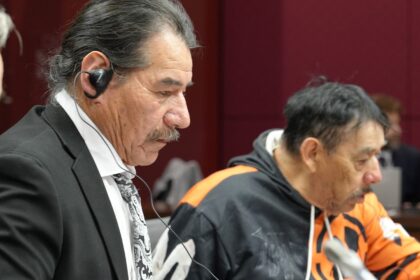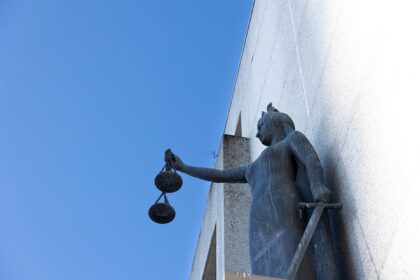Prime Minister Mark Carney’s two-day summit with First Nations leaders comes at a volatile moment, as tensions rise over the One Canadian Economy Act, also known as Bill C-5. Leaders are arriving in Ottawa with questions, legal threats and growing frustration over the fast-tracked law and what it could mean for their lands and rights. “This is a bad decision by the prime minister to short-circuit the need to protect the land, the earth itself, and to trample on our people’s rights and reduce our rights to consultation,” said Ovide Mercredi, a lawyer and former national chief of the Assembly of First Nations (AFN), in a virtual meeting held to prepare for the summit. “We still own this land.” The prime minister may also face some unexpected guests. Wet’suwet’en Hereditary Chief Na’Moks was not invited to the meetings, but he is coming anyway. “This exclusion is not only disrespectful—it undermines the very foundation of Nation-to-Nation relationships,” said in a statement released Tuesday. He added that he, along with other Wet’suwet’en hereditary chiefs, hold recognized Aboriginal title and rights on behalf of the Wet’suwet’en Nation. “Decisions made at this summit will impact our lands and people. We will not be silenced or sidelined,” he said. Jeronimo Kataquapit, 21, a land protector who set up a camp on the Attawapiskat River in northern Ontario to push back on the Ring of Fire development and Ontario’s Bill 5 and Canada’s Bill C-5, says he’s also coming. The Mushkegowuk Council asked Kataquapit to attend. Just one day before the meeting, nine First Nations in Ontario announced a legal challenge over the One Economy Act and Ontario’s Bill 5, which they say were passed without proper consultation. “We First Nations are not against development per se. This is not about a battle between development and not,” said Chief Todd Cornelius of the Oneida Nation of the Thames, one of the litigants in a statement released Tuesday. “It is about doing things recklessly and doing things right.” Other First Nation leaders are drafting pre-litigation letters to provinces like Ontario and B.C., which have passed similar laws to speed up development projects. They are working on legal advice from Drew Lafond, a partner at MLT Aikins who has been advising the AFN on the bill. Some leaders attending the meeting plan to ask Carney to repeal the law or send it back to the House of Commons for amendments. “We are looking at what our legal options are and we’ll be supporting community leadership on that—and we’re supporting action on the ground as well,” said Grand Chief of the Chiefs of Ontario, Abram Benedict. “It’s never too late to repeal it. That’s the legislative ability they have.” Abram Benedict, left, seen here at the United Nations with AFN National Chief Cindy The One Canadian Economy Act allows cabinet to fast-track federal approvals for major industrial projects like mines, ports, and pipelines by sidestepping existing laws including the Environmental Protection Act. Approvals can happen behind closed doors, and decisions are not debated in Parliament. Many First Nations leaders are as disturbed by the rushed process that passed the law as they are alarmed by its content. AFN National Chief Cindy Woodhouse Nepinak was the only First Nations leader given a chance to testify before Parliament about the bill. The law was passed last month in just two weeks. Nepinak had urged Parliament to slow the process and consult with rights holders, but her advice was ignored. The prime minister announced this week’s summit on June 20, after it was too late to make amendments or hear further testimony. APTN News reached out to the Privy Council Office which is organizing the summit, to ask if the meetings are considered consultation. “The working sessions are opportunities to engage with First Nations, and Chiefs will be invited to provide input on the implementation of the Building Canada Act,” they said in a written reply. “Rights holders were purposely excluded from appearing before committees examining the bill,” Woodhouse Nepinak told APTN News in an interview. “First Nations are united in an understanding that we have always supported economic development and prosperity for all, but not at the expense of our rights or our responsibility toward environmental stewardship.” More: 9 First Nations challenge federal and provincial project laws in court Ottawa sets agenda for July 17 meeting with chiefs on controversial One Canadian Economy Law No specific projects have been announced yet, but it is expected that many will cross Indigenous lands and territories.Chiefs have raised concerns that the law will shorten consultation periods, lack any requirement for free, prior, and informed consent, and weaken environmental oversight. By concentrating approval power in the hands of the federal cabinet, the law eliminates procedural safeguards, independent assessments and accountability measures that have historically allowed First Nations to influence major project decisions. Whether the upcoming meeting leads to compromise or confrontation will depend on what unfolds behind closed doors. “I think what we want to hear from the prime minister is that they’re prepared to reset the relationship, acknowledge that the approach on Bill C-5 was wrong, and commit to working with First Nations leadership to figure out a path forward—no matter what it takes,” said Benedict. Continue Reading
Facing legal challenges and leaders demanding a repeal of Bill C-5, will the prime ministers summit with First Nations mark a turning point?

Leave a Comment










